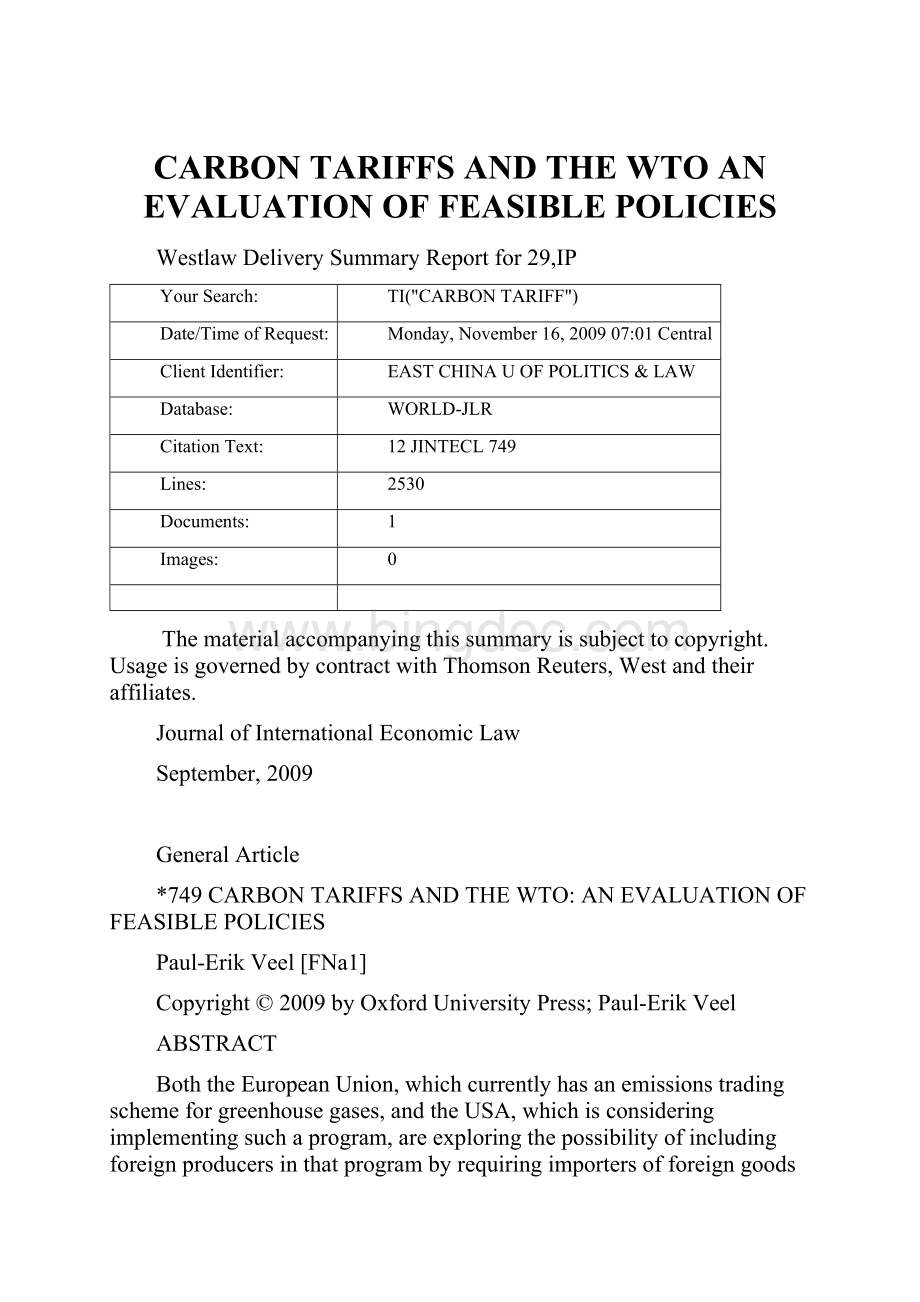CARBON TARIFFS AND THE WTO AN EVALUATION OF FEASIBLE POLICIESWord格式.docx
《CARBON TARIFFS AND THE WTO AN EVALUATION OF FEASIBLE POLICIESWord格式.docx》由会员分享,可在线阅读,更多相关《CARBON TARIFFS AND THE WTO AN EVALUATION OF FEASIBLE POLICIESWord格式.docx(67页珍藏版)》请在冰点文库上搜索。

)
Date/TimeofRequest:
Monday,November16,200907:
01Central
ClientIdentifier:
EASTCHINAUOFPOLITICS&
LAW
Database:
WORLD-JLR
CitationText:
12JINTECL749
Lines:
2530
Documents:
1
Images:
0
Thematerialaccompanyingthissummaryissubjecttocopyright.UsageisgovernedbycontractwithThomsonReuters,Westandtheiraffiliates.
JournalofInternationalEconomicLaw
September,2009
GeneralArticle
*749CARBONTARIFFSANDTHEWTO:
ANEVALUATIONOFFEASIBLEPOLICIES
Paul-ErikVeel[FNa1]
Copyright©
2009byOxfordUniversityPress;
Paul-ErikVeel
ABSTRACT
BoththeEuropeanUnion,whichcurrentlyhasanemissionstradingschemeforgreenhousegases,andtheUSA,whichisconsideringimplementingsuchaprogram,areexploringthepossibilityofincludingforeignproducersinthatprogrambyrequiringimportersofforeigngoodstopaychargesrelatingtotheamountofCO2emittedintheproductionofthosegoods.ThisarticleexaminesthelegalityofsuchmeasuresunderWTOlaw.Whileacademicliteraturehasinrecentyearsconsideredcarbontariffsintheabstract,thisarticlecontextualizesthatdiscussionbyanalyzingEuropeanandAmericanproposalstoenactcarbontariffs,focusingprimarilyonthe2008Lieberman-WarnerBill.Thisarticleconcludesthatcarbontariffsare,subjecttoanumberofconstraints,generallypermissibleunderWTOlaw.However,italsoarguesthatwhilecarbontariffsmaygenerallybelegallypermissible,additionaldomesticpoliticalconstraintsmaysignificantlylimitthesetoflegalcarbontariffswhicharepracticallyfeasibleinanygivenstate.Thisarticlepositsthatanymeaningfuldiscourseoncarbontariffsmustincorporatebothpoliticalandlegalconstraints,anditseekstocontributetothisdiscoursebyidentifyingtherelevantconstraintsandexploringcertainpolicyoptionswhichcouldsatisfythoseconstraints.
I.INTRODUCTION
Asaresponsetoconcernsaboutanthropogenicclimatechangethroughgreenhousegasemissions,andinanattempttofulfilltheirobligationsundertheKyotoProtocol,anumberofjurisdictionshaveenactedorareconsideringenactingeithercap-and-tradeschemesforCO2emissionsorcarbontaxes.However,suchregimesimposeadditionalcostsondomesticproducersrelativetoforeignproducers,andthishasgivenrisetoconcernsaboutthecompetitivenessofdomesticfirmsand'
leakage'
ofcarbonemissionstootherjurisdictionswithlessstringentpolicies.Whilethereare*750anumberofpotentialpolicyresponsestotheseconcerns,[FN1]themeasurethathasbeenthemosthotlydebatedinrecentyearsandisthemostlikelytobeimplementedbystatesisa'
carbontariff.'
Aslegislativemeasurestoimplementsuchtariffsprogress,suchmeasuresareattractingincreasedscrutinyintermsoftheircompliancewithinternationaltradelaw;
forexample,China,amajoropponentofcarbontariffs,hasstatedthatitbelievesthatcarbontariffswouldviolateWTOrules.[FN2]ThisarticlewillthoroughlyexaminethepermissibilityofsuchcarbontariffsunderWTOlaw.
Thescopeofthisarticleislimitedtodiscussingtheseso-called'
carbontariffs,'
whicharedefinedhereasanymeasurewhichimposesalevyonanimportedgoodonthebasisofeithertheCO2emittedintheproductionofthatgoodspecificallyorontheCO2emissionsorCO2emissionreductioneffortsoftheproducingcountrygenerally.Theterm'
carbontariff'
maybemisleading,assuchmeasuresarenotnecessarilytariffsinthetraditionalsense.Suchmeasuresare,asdiscussedbelow,generallybettercharacterizedaschargesleviedonimportswhicharemeanttoequalizethechargespaidbydomesticproducersfortheirCO2emissions.Notwithstandingthepotentialconfusion,giventhatthetermcarbontariffisoftenusedinpopularparlancetorefertosuchmeasures,thisarticleadoptsthatterm,hopingthatthisclarificationwillpreventconfusionthroughoutthisarticle.Thisarticledoesnotdiscussothersimilarbordercharges,suchasenergytaxadjustmentsattheborder,whichhavebeendiscussedelsewhere.[FN3]Italsodoesnotdiscussthetrade-relatedaspectsofothermeasuresstatesmightpotentiallytaketolimitgreenhousegasemissions,suchassubsidiesforgreentechnology[FN4]orotherdomesticregulatoryregimes.[FN5]Rather,itfocusesspecificallyoncarbontariffsasdefinedabove,assuchtariffshavebeen*751consideredinsomedepthoverthepastyearbyboththeUSAandtheEuropeanUnion(EU).
Whiletherehasbeenmuchliteratureinrecentyearsonthepermissibilityofcarbontariffs,thatliteraturehasgenerallyconsideredcarbontariffsintheabstract.ThisarticlewillcontextualizethatdiscussionbyanalyzingEuropeanandAmericanproposalstoenactcarbontariffs.Morespecifically,itwillprobethevalidityofcarbontariffsunderWTOlawthroughadetailedanalysisoftheprovisionsoftheLieberman-WarnerBill,abillproposedintheUSSenatein2007whichwouldhaveseentheintroductionofanAmericancarbontariff.Usingthisbillasafoil,thisarticleconcludesthatcarbontariffsare,subjecttoanumberofconstraintsontheexactstructureofthosetariffs,generallypermissibleunderWTOlaw.
However,italsoarguesthatwhilecarbontariffsmaygenerallybelegallypermissible,additionaldomesticpoliticalconstraintsmaysignificantlylimitthesetoflegalcarbontariffswhicharepracticallyfeasibleinanygivenstate.Thisarticlepositsthatanymeaningfuldiscourseoncarbontariffsmusttakeintoaccountbothpoliticalandlegalconstraints,anditseekstocontributetothisdiscoursebyidentifyingtherelevantconstraintsandexploringcertainpolicyoptionswhichcouldsatisfythoseconstraints.Astheprimarypurposeofthisarticleistoexaminethefeasibilityofsuchtariffs,thisarticledoesnotpurporttoreachanydefinitiveconclusionsontheultimatedesirabilityofenactingsuchtariffs.However,itdoesultimatelysuggestthatstatesshouldexercisecautioninenactingsuchtariffs.
Thisarticlewillproceedasfollows.Parttwoprovidesanoverviewoftheeconomicandpoliticaljustificationsforcarbontariffsaswellassomeoftheirpotentialpitfalls.PartthreeprovidesadetailedoverviewofclimatechangepolicyintheEUandtheUSA,withaparticularfocusonrecentproposalsforcarbontariffsfromthosejurisdictions.PartfourexaminesthelegalityofcarbontariffsunderWTOlawandexplorestheconstraintsthatWTOlawplacesontheirstructure.Partfivethenintegrateslegalandpoliticalconstraintsforthepurposeofbrieflyoutliningfeasiblepolicyoptionsfordealingwithcompetitivenessconcerns.Partsixthenprovidesabriefconclusion.
II.POLICYCONSIDERATIONSRELATINGTOCARBONTARIFFS
PriortoexaminingproposalsforcarbontariffsorexaminingtheWTO-legalityofsuchtariffs,itisimportanttounderstandwhycountriesareconsideringimposingsuchtariffs.Thissectionfirstexaminesthreereasonswhystatesmaydecidetoimposecarbontariffstocomplementdomesticcap-and-tradesystemsorcarbontaxes:
'
ofCO2emissions,competitivenessconcerns,andpoliticaleconomyconsiderations.
Onerationaleadvancedforcarbontariffsisthattheyprevent'
ofCO2emissionstoforeigncountriesthatdonothaveeffectivecap-and-tradesystemsorcarbontariffs.Thenotionhereisthatwithoutcarbontariffs,*752firms--especiallyinthoseindustrieswhichhaverelativelyhighCO2emissionswhichcannotbeabatedatlowcost--thatarerequiredtopaycarbontaxesorpurchaseemissionallowanceswhenoperatinginthatjurisdictionmayrelocatetoaforeignjurisdictionwhichdoesnotimposesimilarchargesonfirms'
CO2emissions.[FN6]Producinginthatforeignjurisdiction,thefirmcanthenexportitsproductsbacktoconsumersinthejurisdictionwiththeCO2emissionschargeswhichitleft.Inthesecircumstances,theabatementofCO2emissionswhichthehomejurisdiction'
semissionschargewassupposedtorealizedoesnotactuallyoccur,asthefirmhasavoidedthechargesbyrelocatingitsoperationsandmerelyemittingtheCO2inanotherjurisdiction.[FN7]Acarbontariffisintendedtolessenornegatethiseffectbyensuringthatfirmsproducingformarketsinaparticularjurisdictioncannotevadethechargesbyrelocatingtheiroperationstoaforeignjurisdiction.
Asecondandrelatedeconomicrationaleforcarbontariffsisthattheyensurethatforeignproducersincountrieswithoutcarbontaxesorequivalentschemesdonotbenefitfromanartificialcomparativeadvantagestemmingfrommorelaxregulationsongreenhousegasemissions.Thenotionofacomparativeadvantagerestsontheideathatthosecountriesthatareabletoproducecertaingoodsrelativelymoreefficientlythanothersshoulddoso.[FN8]Whilenormallyweviewitaseconomicallyoptimalforcountriestoexploitwhatevercomparativeadvantagetheymighthave,thecomparativeadvantageflowingfromamorepermissiveregimeforgreenhousegasemissionsisdifferentfromotherformsofcomparativeadvantage,asitresultsinthenegativeexternalityofincreasedglobalwarming.[FN9]Althoughitremainsdesirableforthosecountriesthatarerelativelymostefficientatproducingaparticulargoodtoproduceit,thenotionofefficiencynecessarilyneedstoincludethose*753externalitieswhichariseasaresultofthatproduction.CarbontariffseffectivelyforceforeignproducerstointernalizetheexternalityofCO2emissions,atleasttothesamedegreeasdodomesticproducers.
Whilebothoftheserationalesprovideeconomicjustificationsforcarbontariffs,muchof